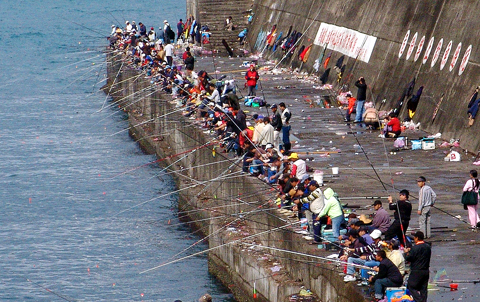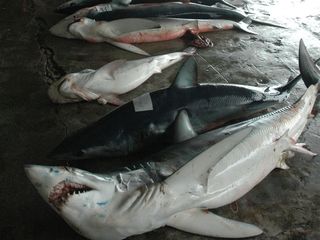My friend Patrick recently did me a solid by posting a small promo about this site on his blog. The post elicited the following response from a reader identified only as “Anonymous.”
“It is said that more people start fishing when recession hits the society harder. I don’t know if it is because more people are out of work or they need fish for food. The rivers are so clean when we left the island years back but we have kept hearing that the streams are all polluted and contaminated nowadays. We are cautioned not to eat too much fresh water fish in the States for avoiding mercury poisoning. Are those anglers in Taiwan fishing just for the sake of enjoying the game of fishing or supplement their catch for food?”
It’s a good question and raises some interesting issues that got me thinking. The short answer is no, most anglers out on the water today are there because they want to relax and/or enjoy the thrill of hooking and landing something they can brag about at the office on Monday. The guy fishing just to put food on the table still exists. I watched a trio of men netting tilapia in Sanxia other day as if the lives of their families depended on it. It turned out they were just having a riverside cookout (in downtown Sanxia!).
To me, the broader question is this: is the face of recreational fishing changing in Taiwan and where is it going? Can the growth of recreational fishing have a positive impact on the local economy and natural environment?
 Anglers crowd breakwater at Badouzih fishing port in Keelung. PHOTO: CNA
Anglers crowd breakwater at Badouzih fishing port in Keelung. PHOTO: CNA
I’ve only lived in Taiwan for a little more than a decade, but from what I have observed first hand and from what I have learned from others, there does seem to be something of a sport fishing renaissance afoot on the island. Anonymous’ question hints at the belief that fishing in Taiwan is more of a subsistence activity than recreation, and therefore it remains the domain of the working class. Fishing for sustenance was a big part of rural life before local economy boomed in the ’80s and there is still a prejudicial association with those days--even for sport angling--among a small segment of the population. Certainly recreational angling still remains popular among lower income groups because it is relatively cheap to get into on the basic level and recent statistics have shown that the fishing industry has grown during the recent economic downturn.
However, this view ignores the reality that more and more middle and upper income individuals are rediscovering angling. I say rediscovering, because many of today’s Taiwanese middle class grew up in more humble conditions than they enjoy today and more than a few probably spent their childhoods hooking tilapia with their uncles, aunties and grandparents in rural canals. Today those former kids with cane poles are kitted out in NT$10,000 worth of top-of-line Japanese gear and paying NT$7,000-a-head on offshore charters.
It is the emergence of this new class of angler that some are hailing as potential cash cow for the island’s ailing commercial fishing harbors. That’s not accounting for the foreigners. At the moment, Taiwan is more or less off the map with respect to the globe-trotting sport fishing community, overshadowed in Asia by Japan, Thailand and smaller tropical islands. That could change if the government made an effort to promote the Taiwan as an international sport fishing destination by making charters and guiding services more accessible to tourists. As any foreigner will tell you, it’s not exactly easy to book or even find information on a fishing charter in Taiwan.
It’s fair to wonder what impact additional pressure would have on the region’s already heavily depleted fish stocks. I’m optimistic that education and sustainable practices like catch-and-release can work in Taiwan. Catch-and-release is already an accepted practice amongst most foreign anglers, so I doubt that sport fishing tourism will have much of a negative impact on fish stocks, and certainly nothing on the scale of the damage wrought by commercial practices like long-lining, bottom trawling and drift netting.
On the contrary, the popularity recreational angling could be the best thing for the local environment. In the West, hunting and fishing groups have often been on the forefront of successful conservation efforts. Two stand-out examples are Trout Unlimited and Ducks Unlimited, who have done much to preserve and rehabilitate wetlands and waterways in North America. The bottom line is that devoted anglers know the best way to ensure that they and future generations can enjoy their pastime is to work to improve existing environmental conditions.
The cynics may say that these attitudes could never take hold in Taiwan, but I’ve seen with my own eyes local fishing club members cleaning up patches of shoreline, and I’m not just talking about picking up their own empty cans and line cuttings. I’ve seen the members of the island’s fledgling fly fishing community practicing catch-and-release. It’s not such a leap to imagine anglers pushing for stricter environmental protections for Taiwan’s rivers, lakes and coastal waters.
To answer Anonymous’ original question: Why are people in Taiwan fishing, for food or fun? I would say both. But if they want to keep enjoying all that angling has to offer, local anglers are going to have to take a stand on how they and their fellows approach sport fishing, and decide whether they are willing to be stewards of the very special resource from which they derive so much enjoyment.
 Friday, April 13, 2012 at 5:31PM
Friday, April 13, 2012 at 5:31PM  Shoals of shovelmouth carp in the Danaiku Ecological Park.The Chiayi County township of Danaiku is expanding its successful local conservation program by boosting fish stocks in other area streams. The township banded together a few years ago and created a very successful grassroots program to protect the township's traditional fishing grounds from illegal electrical and cyanide fishing. The resulting Danaiku Ecological Park is now showcase program and the town's streams teem with fish--mostly striped dace and shoveljaw carp--which tour groups can tour and view. The township is now launching an combined tree planting and fish stocking program to improve conditions in other area streams within the Zengwen River drainage.
Shoals of shovelmouth carp in the Danaiku Ecological Park.The Chiayi County township of Danaiku is expanding its successful local conservation program by boosting fish stocks in other area streams. The township banded together a few years ago and created a very successful grassroots program to protect the township's traditional fishing grounds from illegal electrical and cyanide fishing. The resulting Danaiku Ecological Park is now showcase program and the town's streams teem with fish--mostly striped dace and shoveljaw carp--which tour groups can tour and view. The township is now launching an combined tree planting and fish stocking program to improve conditions in other area streams within the Zengwen River drainage.  Chris Jackson |
Chris Jackson |  Post a Comment |
Post a Comment |  25 References | | tagged
25 References | | tagged  conservation,
conservation,  dace,
dace,  river fishing,
river fishing,  shovelmouth carp in
shovelmouth carp in  Fishing News
Fishing News 














